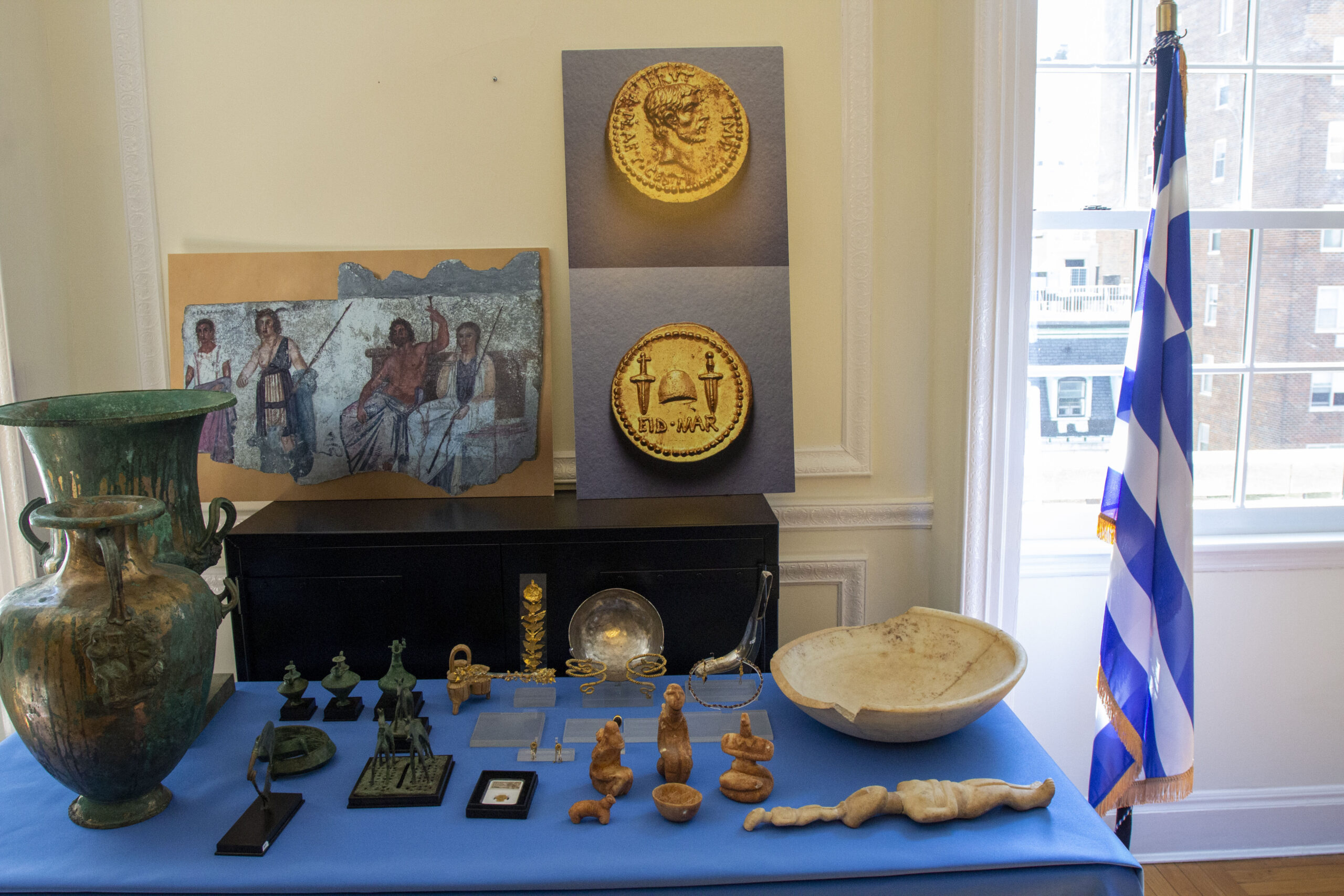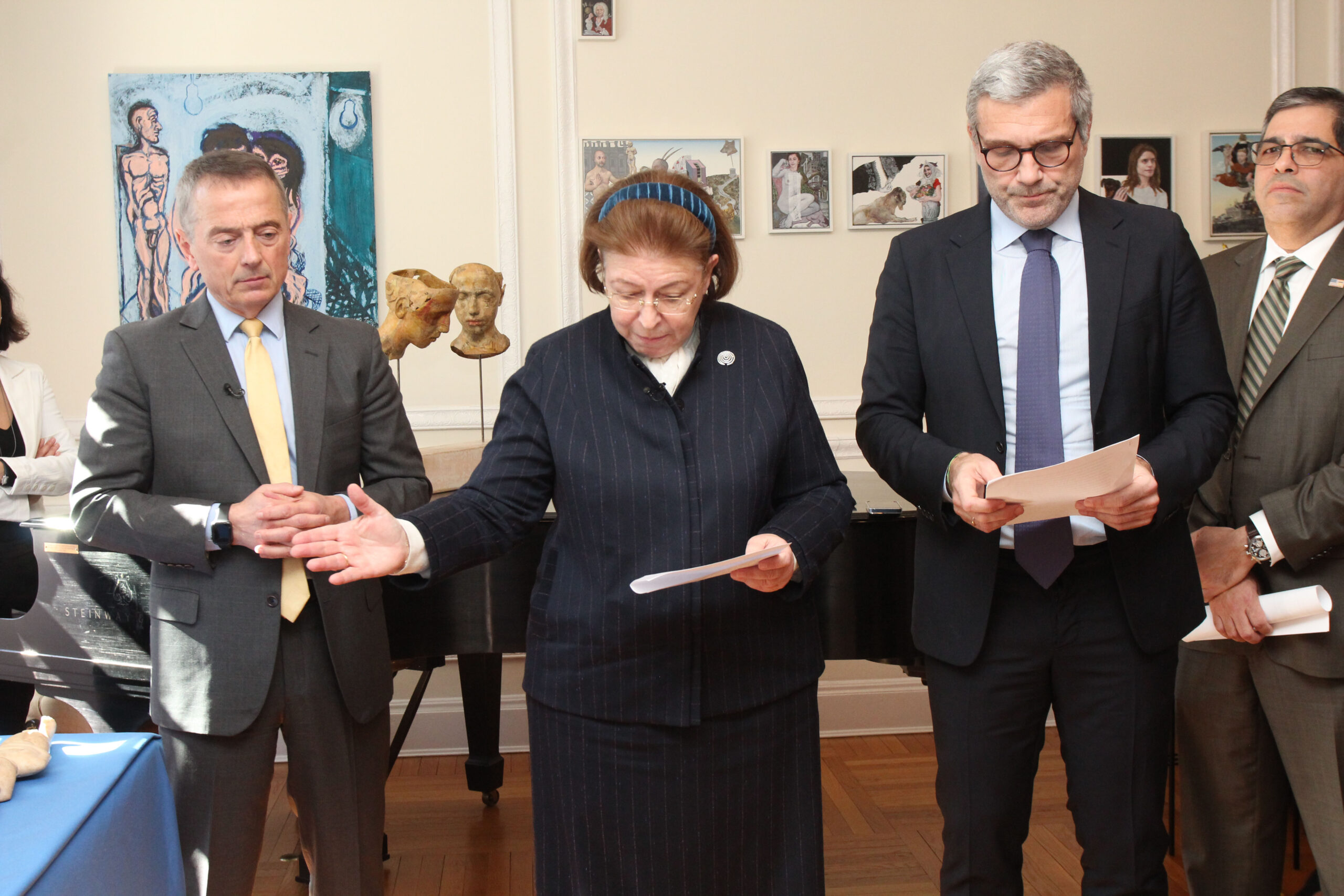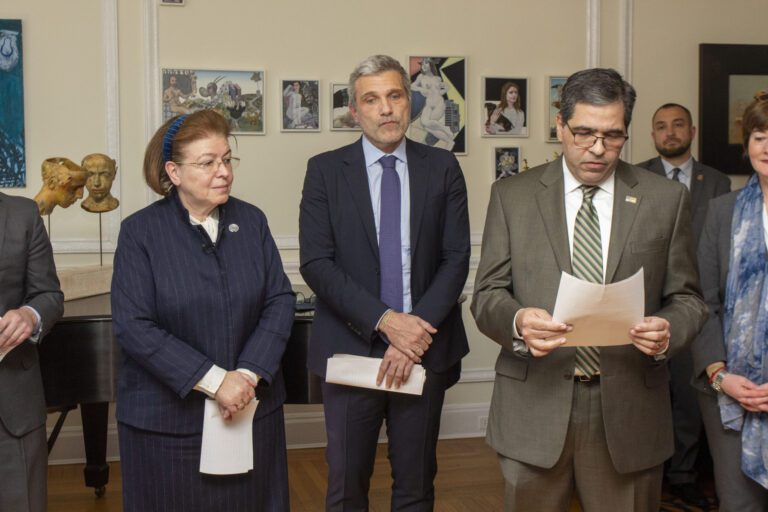By Fotis Kaliampakos
On Monday, March 20, the Consulate General of Greece in New York organized a ceremony to hand over to the Greek state 29 ancient objects that had been stolen or illegally exported from Greece in the past. The official reception protocols were also signed during the event. The objects were received on behalf of the Greek State by the Minister of Culture, Ms. Lina Mendoni, also in the presence of officials from the Ministry of Antiquities Protection. The department has cooperated with foreign authorities on similar cases for years, and this is not the first time Ms. Mendoni has come to the United States to receive ancient artifacts. Last time, a transfer of power took place at the New York prosecutor’s office, while recently a similar transfer took place in Chicago in the presence of the consul general, Emmanuel Koumbarakis, also known for his tenure as consul in New York.
Konstantinos Konstantinou
The Minister of Culture and guests were welcomed by the host of the event, Consul General of Greece in New York Konstantinos Konstantinou, who spoke about the importance of returning the objects to Greece and highlighted the fact that These objects, although they are usually valued in According to their value on the international art market, the latter being estimated at 20 million dollars, they are in reality priceless. Mr. Constantinou spoke about the importance of these objects and each one individually with the particular history or information it conveys about the history and culture of Greece and humanity.
 Vases, figurines and “objects of the month of March”
Vases, figurines and “objects of the month of March”
Thanks for reading Hellenic News of America
This time, the site of the Consulate General was chosen, the ancient objects being highlighted in the bright living room of the consular residence while awaiting their return to the Greek sun. The objects come from different periods of Greek history, from prehistory to Roman times and also from various regions, including Macedonia, Crete, Central Greece and the Cyclades. These include human and animal figurines, marble, silver, bronze and earthenware vessels, gold and bronze jewelry, and part of a fresco found in the Shelby White collection. A particularly rare and special item on display was a Roman gold coin, known as “Eid Mar”.
The gold coin of betrayal
Eid Mar was struck by the perpetrators of the assassination of Julius Caesar by Brutus in March 44 BC. A story that went down in history as an act of betrayal and ingratitude, since Brutus was Caesar’s protégé. Indeed, as soon as Caesar saw him among the conspirator-assassins who were approaching him, he only had time to exclaim the phrase which has since symbolized betrayal throughout the centuries: “And you, Brutus”! The coin depicts Brutus on one side and a “pilo” (hat, cap) between two swords on the other, alluding to the manner in which Caesar was assassinated. The coins had been minted in Macedonia, where Brutus later took refuge, to pay in silver and gold the troops loyal to him in the civil war which followed Caesar’s assassination. And although there are around 100 silver coins, the coin that stands out on the table in the consular residence is one of only three gold coins (Aurei) that survive! It was fascinating to see.
International interest
At the time of writing, the report on the return of the coin, whose monetary value is estimated at $4.2 million, was also published in the New York Times: https://www.nytimes.com/ 2023/03/22/ arts/design/rare-coin-returned-greece-eid-mar.html?smid=fb-nytimes&smtyp=cur&fbclid=IwAR0954pwG-oPMCYiJ08CEHtd1Zv3dAUnzFlmf_QLHZnIrm64XsSec1fJQFk
with the title: “A rare coin, struck by Brutus on the death of Marc Caesar, is returned to Greece”. The report in question, although it focuses on the piece in question, also mentions the restitution of all 29 pieces, including in detail the progress of the investigations and the imprisonment of the merchant-traffickers. Concluding his speech, Mr. Konstantinos highlighted the plight of those who attempt to return ancient treasures to Greece. In addition to the New York Times, the event brought together numerous American journalists as well as a national channel, as well as the entire Greek community of New York and numerous local media.
 Lina Mendoni
Lina Mendoni
The Minister of Culture, Ms. Lina Mendoni, then took the floor in place of Mr. Constantinou and underlined the importance that the Greek State has always attached to the protection of its cultural heritage, and more particularly to cooperation with the Manhattan Attorney General’s Office, which has borne fruit in recent years. Ms. Mendoni praised Matthew Bogdanos as well as the relevant departments of the ministry.
“This is what we fought for”
Ms. Mendoni, on the occasion of the anniversary of March 25, which coincides, as she said, with the restitution of specific objects, made a particular reference to Makrygiannis, revealing the relationship of the Greeks and the Greek state with ancient heritage, mentioning the incident from his memoirs: “’I had two statues’ famous, a royal woman and child, dull – the veins were visible, they were so perfect. When they destroyed Poros, soldiers took them, and in Argos they were going to sell them to the Europeans for a thousand talars… I took the soldiers, I said to them: These and ten thousand talars to give you, don’t do not accept is to leave our homeland. This is what we fought for. This reference was particularly noticeable in the atmosphere of the room since Ms. Mendoni, due to the presence of the American media, went further by proposing a particular interpretation of the specific passage from Makrygiannis by the Nobel Prize-winning poet Giorgos Seferis.
Georges Seferis
“Do you understand? It is not Lord Byron who is speaking, nor the scholar, nor the archaeologist; the son of a shepherd from Roumeli speaks with his body full of wounds. “That is why we have beaten.” The rest of Seferis’s text from his essays, to which Ms. Mendoni was referring, is as follows: “Fifteen golden academies do not deserve this man’s conversation. For only in such feelings can the Gender education can take root and flourish. In real feelings and not in abstract notions about the beauty of our ancient ancestors or in dry hearts seized by the fear of the crowd.
The driving force behind the effort is Greek-American Matthew Bogdanos
The driving force behind this effort is the Greek-born assistant to Manhattan Attorney General Matthew Bogdanos, who took the stage and spoke with enthusiasm and passion about his ongoing efforts to uncover and dismantle the antiquities and smugglers’ rings. Mr. Bogdanos underlined the excellent assistance of the Greek authorities, the minister herself as well as the two senior officials of the Ministry of Culture present in the room, Elena Vlachogianni and Vasiliki Papageorgiou, heads of the Documentation and Protection Department. of Cultural Property of the Ministry of Culture.
Wanting to emphasize the ongoing nature of this effort, Mr. Bogdanos pointed out that even as we speak and return stolen antiquities, somewhere in the world a new antiquities theft is occurring. So, Mr. Bogdanos joked that at least his staff, after the coffee and refreshments offered by the Consul General, should return to work immediately, that afternoon!
Mr. Bogdanos praised the dedication to this project of both Manhattan Attorney General Alvin Bragg and his staff members present, as well as his partner and chief investigator Ivan J. Arvelo of the Internal Security Service. from New York, who also took the floor, paying tribute to his colleagues. He spoke passionately about the importance of the cultural treasures of Greece, recognized worldwide as the cradle of civilization.
Mr. Bogdanos also discussed the fact that multicultural New York – after all, the consulate is adjacent to the Metropolitan Museum, a representative of which was also present at the ceremony, and a number of art galleries and museums – wants them works of art but only those which have been acquired and are exhibited in a completely legal manner.
Deeply aware of his Greek heritage and after announcing to us in Greek that he would speak English, Mr. Bogdanos spoke about his long-term efforts in this area, which concern not only Greece but many countries. It is clear from his passionate speech and his knowledge of the place and people present that he feels something close when his efforts concern the homeland of his ancestors, from which all can benefit.


